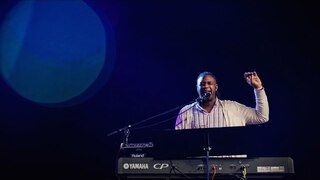Hymn to St. Cecilia - Benjamin Britten, John Rutter, The Cambridge Singers
II. 'Hymn to St. Cecilia'
From the album Cambridge Singers A Cappella
Composer Benjamin Britten
Conductor John Rutter
Soprano Caroline Ashton
Soprano Donna Deam
Alto Susanna Spicer
Tenor Angus Smith
Bass Charles Pott
Choir The Cambridge Singers
https://smarturl.it/CambSingersACappella
Find more of the catalogue and curated playlists by subscribing to the channel:
Social Media Links:
Facebook: https://www.facebook.com/johnruttermusic
Twitter: https://twitter.com/johnmrutter
Instagram: https://www.instagram.com/johnrutter.composer/
Website: https://www.johnrutter.com
Hymn to St Cecilia
This, the last of several works Britten wrote in collaboration with W. H. Auden, was planned in August 1940 when composer and poet were both living in the United States. Britten began work on the music, but, in his own words, ‘got stuck’, and did not resume until his voyage home to England in the spring of 1942. The Hymn to St. Cecilia and the Ceremony of Carols were completed aboard the Swedish steamship Axel Johnson, and the Hymn received its first performance by the BBC Singers in the same year on November 22nd, St. Cecilia’s Day and Britten’s birthday.
LYRICS:
I. In a garden shady this holy lady
With reverent cadence and subtle psalm,
Like a black swan as death came on
Poured forth her song in perfect calm:
And by ocean’s margin this innocent virgin
Constructed an organ to enlarge her prayer,
And notes tremendous from her great engine
Thundered out on the Roman air.
Blonde Aphrodite rose up excited,
Moved to delight by the melody,
White as an orchid she rode quite naked
In an oyster shell on top of the sea;
At sounds so entrancing the angels dancing
Came out of their trance into time again,
And around the wicked in Hell’s abysses
The huge flame flickered and eased their pain.
Blessed Cecilia, appear in visions
To all musicians, appear and inspire:
Translated Daughter, come down and startle
Composing mortals with immortal fire.
II. I cannot grow;
I have no shadow
To run away from,
I only play.
I cannot err;
There is no creature
Whom I belong to,
Whom I could wrong.
I am defeat
When it knows it
Can now do nothing
By suffering.
All you lived through,
Dancing because you
No longer need it
For any deed.
I shall never be
Different. Love me.
Blessed Cecilia, appear in visions
To all musicians, appear and inspire:
Translated Daughter, come down and startle
Composing mortals with immortal fire.
III. O ear whose creatures cannot wish to fall,
O calm of spaces unafraid of weight,
Where Sorrow is herself, forgetting all
The gaucheness of her adolescent state,
Where Hope within the altogether strange
From every outworn image is released,
And Dread born whole and normal like a beast
Into a world of truths that never change:
Restore our fallen day; O re-arrange.
O dear white children casual as birds,
Playing among the ruined languages,
So small beside their large confusing words,
So gay against the greater silences
Of dreadful things you did: O hang the head,
Impetuous child with the tremendous brain,
O weep, child, weep, O weep away the stain,
Lost innocence who wished your lover dead,
Weep for the lives your wishes never led.
O cry created as the bow of sin
Is drawn across our trembling violin.
O weep, child, weep, O weep away the stain.
O law drummed out by hearts against the still
Long winter of our intellectual will.
That what has been may never be again.
O flute that throbs with the thanksgiving breath
Of convalescents on the shores of death.
O bless the freedom that you never chose.
O trumpets that unguarded children blow
About the fortress of their inner foe.
O wear your tribulation like a rose.
Blessed Cecilia, appear in visions
To all musicians, appear and inspire:
Translated Daughter, come down and startle
Composing mortals with immortal fire.
(W. H. Auden, 1907–73)
(Reprinted by permission of Faber & Faber Ltd.)
Cambridge Singers A Cappella
This album explores the great wealth of music written for unaccompanied choir in England, France and Germany during the Romantic era and into the twentieth century. The pure, distilled beauty of the a cappella medium inspired the composers heard on this album to some of their most poetic and delightful compositions.
John Rutter, English composer and conductor, is associated with choral music throughout the world. His recordings with the Cambridge Singers (the professional chamber choir he set up in 1981) have reached a wide global audience, many of them featuring his own music in definitive versions. Among John’s best-known choral works are Gloria, Requiem, Magnificat, Mass of the Children, and Visions, together with many church anthems, choral songs and Christmas carols.




















